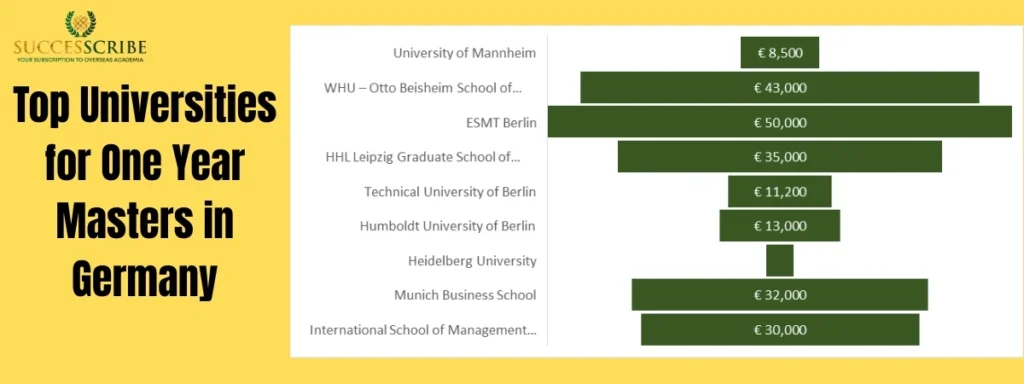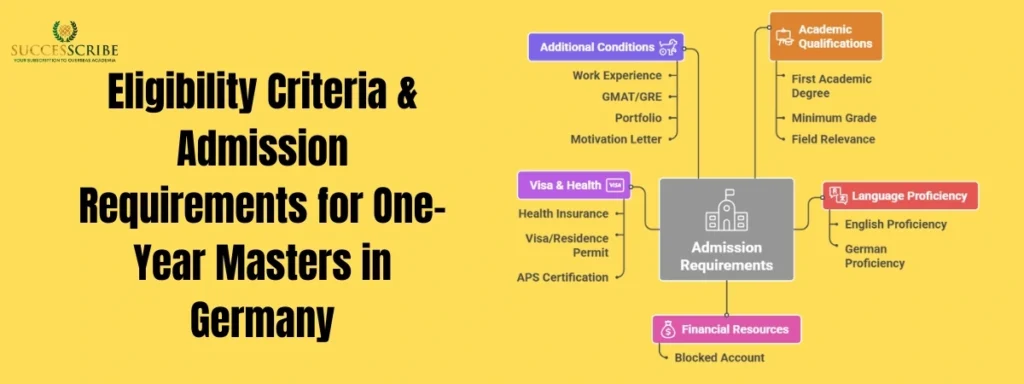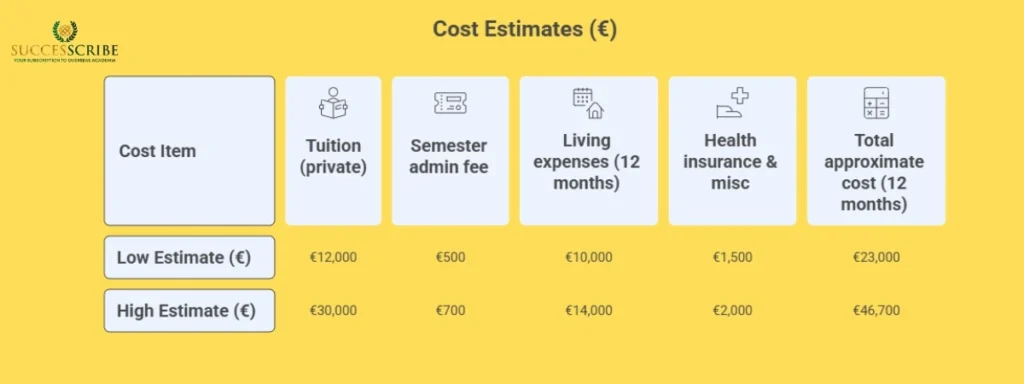When most people think of a Master’s degree in Germany, they assume a duration of 18 to 24 months (1.5–2 years). Indeed, the typical model at many German public universities is two years (4 semesters) comprising 120 ECTS. However, in recent years there has been growing interest in accelerated or “fast-track” master’s programmes of 12 months (one year, 2 semesters + thesis) offered by certain institutions (often private or applied-science universities) in Germany. These programmes are designed for students who want to complete their postgraduate degree quicker, reduce time out of the job market, and limit living costs. In this topic, we’ll dive deep into everything you need to know about one year Masters in Germany. For Indian students (and other international applicants), a one-year master’s option can be very appealing: finish faster, enter the workforce sooner, save on one year of living costs, and still gain the benefit of studying in Germany with its high-quality education system and work-opportunity rights. That said – it’s essential to understand the details, eligibility, trade-offs, and whether the “one‐year” format truly fits your background and goals.
Key Highlights: One Year Masters in Germany
- Overview of One-Year Master’s in Germany – Understand how these accelerated 12-month programmes differ from the traditional 2-year master’s.
- Why Choose a One-Year Master’s – Key benefits like faster completion, lower costs, and quicker career entry.
- Important Caveats – What to consider before applying, including workload, recognition, and eligibility challenges.
- Top Universities Offering One-Year Master’s in Germany – Detailed table of top institutions, courses, and tuition fees.
- Key Benefits Summary Table – Quantified advantages such as time saved, cost reduction, and job opportunities.
- Eligibility Criteria & Admission Requirements – Detailed checklist for academic, financial, and visa requirements.
- Types of One-Year Master’s Programmes – Field-wise breakdown: Business, Engineering, IT, Data Science, Arts, and more.
- Cost of Studying a One-Year Master’s – Full cost breakdown including tuition, living expenses, and total estimates.
- Scholarships for One-Year Master’s Students – DAAD and other major funding options available to international students.
- Career Prospects After Graduation – Job roles, salary ranges, and post-study work visa opportunities.
- Return on Investment (ROI) Insights – Cost vs. salary comparison and career growth potential.
- Conclusion – Final thoughts on how to choose the right one-year master’s and maximize your outcome.
- FAQs – Quick answers to the most common questions about one-year master’s in Germany.
Why Choose a One-Year Master’s in Germany?
Selecting a one year masters in Germany can offer a range of advantages:
- Shorter Duration: Completing in around 12 months means you spend less time away from employment, accelerate your return on investment, and reduce overheads such as accommodation and living expenses.
- Lower Overall Cost: Because you’re studying for only one year (instead of 1.5 or 2), you incur fewer months of living expense, which for many students is a major share of cost. Also many private one-year programmes have fixed fees.
- Quality of German Education: Germany remains known for its excellent higher-education system, strong research and industry links, and global recognition of degrees. Studying at a German university adds weight to your CV internationally.
- Work Opportunities After Graduation: International graduates in Germany typically have the right to apply for an 18-month job-seeking visa (“residence permit for the purpose of looking for employment”). Completing quickly could help you move into employment sooner.
- English-Taught Programmes: Many of the one-year programmes are offered in English, making them accessible to international students even without German language proficiency (though German helps).
- Career Focus: Many one-year programmes are professionally oriented (e.g., in business, data science, digital marketing) rather than purely research-based, which aligns with students aiming to enter the job market quickly.
Important caveats
However, you should be aware of several trade-offs:
- The one-year format is less common, especially among public universities; many standard programmes are 1.5-2 years.
- Intensity: A one-year programme often means a more compressed schedule with fewer breaks and higher workload.
- Eligibility requirements may be more stringent (for example, a 4-year bachelor, relevant background, particular language/internship expectations).
- Some employers (especially in Germany) may expect the standard 90-120 ECTS master’s or two-year duration; you should check how your specific qualification is perceived.
- Living costs in Germany vary widely; one year is still a substantial time, and you must ensure you can support yourself.
- Even after graduation, obtaining a job is not automatic – work permit regulations and competitive job markets apply.
Top Universities for One Year Masters in Germany

When selecting a one-year master’s program in Germany, the choice of university is paramount due to differences in program offerings, fees, recognition, and industry connections.
| University | One Year Programs | Tuition Fee (EUR) |
| University of Mannheim | LL.M. Comparative Business Law (1 year) | €8,500 |
| WHU – Otto Beisheim School of Management | Full-time MBA | €43,000 |
| ESMT Berlin | Full-Time MBA | €50,000 |
| HHL Leipzig Graduate School of Management | Full-time MBA | €35,000 |
| Technical University of Berlin | LL.M. Energy Law (1 year) | €11,200 |
| Humboldt University of Berlin | LL.M. International Dispute Resolution (1 yr) | €13,000 |
| Heidelberg University | LL.M. International Law (1 year) | €3,000 |
| Munich Business School | MBA, Master in Management (1 year) | €32,000 |
| International School of Management (ISM) | Full-Time MBA | €25,000 – €30,000 |
Key Benefits of Studying a One Year Master’s in Germany
Here is a summary table of the primary benefits, with some quantification where available:
| Benefit | What you gain | Typical numeric indication |
| Faster entry into job market | Finish in 12 months instead of 18-24 months | 6–12 months saved |
| Reduced living cost | Less time in Germany = less expenditure | If living cost €900-1 200/month → saving of €5 400-€10 800 |
| Lower tuition (sometimes) | Some programmes fixed fee for 1 year | E.g., €12 000-€15 000 for 1-year programme |
| International recognition | German degree valued globally | |
| Work permit & job-hunting support | Post-study job-search rights in Germany | Up to 18 months job-seeking stay permit |
| English instruction | Accessibility for non-German speakers | Many 1-year programmes in English |
| Professionally focused | More career-oriented curricula | E.g., business, analytics, digital marketing |
In essence: for a student who wants to minimise time and cost while still gaining a strong European credential and access to work opportunities in Germany, a one-year master’s can be an excellent strategic choice.
Suggested Post: Benefits of doing masters in Germany
Eligibility Criteria & Admission Requirements for One-Year Masters in Germany

Securing a spot in a German one-year Master’s demands preparation, but the bar is achievable with a solid academic foundation. Unlike two-year programs, these accelerated tracks often require a “higher” Bachelor’s qualification, reflecting their condensed nature.
Let’s break down the key requirements for One year Masters in Germany:
| Requirement Category | Standard Expectation | Key Notes & Tips |
| First Academic Degree | Bachelor’s or equivalent (3-4 years) | Check recognition (Anabin/ZAB); ensure relevance to master’s |
| Minimum Grade / Academic Record | 60% or equivalent (or higher) | Stronger profile = higher chance; relevant bachelor subject |
| Field Relevance | Bachelor’s field aligned with master’s discipline | Especially for specialised masters (data, engineering, etc.) |
| Language Proficiency – English | IELTS 6.0–6.5+ / TOEFL 90+ (for English-taught) | Submit valid certificate; check university minimums |
| Language Proficiency – German | German at B2–C1 if required | Even if English programme, German helps for daily life/jobs |
| Proof of Financial Resources | Blocked account: €11,904/year (€992/month) in 2025 | Deposit before visa; shows you can support your stay |
| Health Insurance | Valid student health insurance | Mandatory for enrolment |
| Visa / Residence Permit | Student visa (for non-EU/EEA) | Apply early; register address (“Anmeldung”) on arrival |
| APS Certification (Indian Applicants) | APS certificate may be required for visa/residence permit | Verify with university and visa office |
| Additional Conditions | Work experience, GMAT/GRE, portfolio, motivation letter | Depends on programme — read university requirements |
| Intakes & Deadlines | Winter (Oct) & Summer (Apr) intakes common | Submit application 6-8 months ahead |
Suggested Post: RWTH Aachen University top courses
Special Note for One-Year Master’s Programmes
Since one-year (12-month) master’s programmes in Germany are accelerated formats, applicants should pay attention to these extra criteria:
- Ensure your bachelor’s degree is sufficiently rigorous (and relevant) because the master’s curriculum will proceed quickly.
- Confirm whether the university expects a 4-year bachelor’s (or equivalent) or expects bridging modules for those with 3-year bachelor’s. Some one-year formats may require this.
- The language of instruction: Many one-year programmes are in English, but you should still check & possibly plan for basic German for daily life and job prospects.
- Because the timeline is short, documentation & application must be complete, submitted early, and you must be ready to begin full-time from day one.
Types of One-Year Master’s Programs (Business, Engineering, IT, etc.)
One‐year master’s programmes in Germany are more common in certain fields than others. Below is a breakdown of typical subject areas where one-year formats are available, and what you should know.
1. Business & Management
- These programmes often focus on management, marketing, digital business, analytics, or international business.
- Example: 1-year MBA equivalents or MSc in Digital Marketing / Data Analytics.
- Advantages: Focused curriculum, networking opportunities, often English-taught.
- Considerations: Competition is high; ensure the university is recognised and your bachelor background meets requirements.
2. Information Technology / Data Science / Analytics
- One-year master’s in Data Science, Big Data, AI, or IT Security are being offered by some international private universities or applied universities.
- These programmes assume you already have a strong quantitative and technical background, given the compressed timeline.
- Career prospects: Data Scientist, Analytics Consultant, AI Engineer – high demand in Germany/Europe.
3. Engineering / Technology
- Traditional engineering/programmes (mechanical, electrical, civil) in Germany are more often 1.5-2 years (18-24 months) rather than strictly 12 months.
- One‐year engineering master’s exist but are rarer and may require intensive prior training or bridging modules.
4. Humanities / Social Sciences / Arts
- Some one‐year MA programmes (e.g., in International Relations, Media, Design) exist, especially in applied universities or private institutions.
- These may be less expensive than business programmes, and useful if you aim for quick entry into international roles or further PhD.
Suggested Post: Heidelberg University admission requirements
Cost of Studying One Year Master’s in Germany

Understanding cost is critical. Let’s break down the cost components for a one year masters in Germany:
Cost Components
- Tuition Fee: This varies widely depending on whether the university is public (usually low or none for non-tuition public universities) or private (higher).
- Semester Contribution / Administration Fee: Even public universities charge a “Semesterbeitrag” typically €250-€350 per semester.
- Living Expenses: Accommodation, food, transport, insurance, leisure, study materials. The German Foreign Office recommends approx. €11,208 per year (for 2025/26) as proof of financial resources.
- Other Costs: Health insurance (€110/month for students), books, leisure, travel home, visa/residence permit fees (€100-€150).
| Cost Item | Low Estimate (€) | High Estimate (€) |
| Tuition (private) | €12,000 | €30,000 |
| Semester admin fee | €500 | €700 |
| Living expenses (12 months) | €10,000 | €14,000 |
| Health insurance & misc | €1,500 | €2,000 |
| Total approximate cost (12 months) | €23,000 | €46,700 |
For a one‐year master’s in a private university, you could be spending anywhere from ₹21 lakh to ₹43 lakh (or more) for the full year, depending on tuition and city of residence. For public universities with negligible tuition, your cost could be much lower (perhaps ₹10–15 lakh if living costs dominate).
Public University Scenario
If you manage to get admitted to a public university one-year programme with minimal tuition (rare but possible), cost might look like:
| Tuition | €0-€2,000 |
| Living + insurance etc | €11,000-€14,000 |
Suggested Post: University of Hamburg admission requirements
Scholarships for One Year Masters in Germany
Although one‐year master’s programmes are less common, these scholarship schemes cover any master’s level, so they can apply to one-year formats if the programme is eligible. Many one-year programmes are intensive and require a focused funding strategy – these scholarships help reduce the cost-burden, making one-year format more viable.
| Scholarship (Provider) | What It Covers | Notes & How to Apply |
| German Academic Exchange Service (DAAD) Study & Research Scholarships (Master’s level) | Monthly stipend €934 + health/accident insurance + travel allowance. Tuition cost may also be waived where applicable. | Open to international students for master’s in Germany. Application deadlines vary (often late in year). Check DAAD database. |
| Heinrich Böll Foundation / Konrad‑Adenauer‑Stiftung / Other Political/Foundation Scholarships | Monthly stipend roughly €1,000+ (INR 80-90 k+) for master’s/PhD plus support for research, travel, insurance. | These typically require strong academic performance, social engagement, leadership or profile matching the foundation’s focus. |
| University-Specific Scholarships | Merit-based or need-based tuition waivers or living-cost grants (amounts vary) | Check the specific university you’re applying to. For one-year master’s programmes (often private), these can help significantly. |
Career Prospects After a One-Year Master’s in Germany
Completing a one-year master’s programme in Germany can open up strong career and professional mobility opportunities – especially when you pick the right field, build relevant skills, and leverage the German system smartly.
Post-graduation Work Opportunities & Visa Options
- Upon graduation from a recognised German university, non-EU/EEA international students are eligible to apply for an 18-month job-seeker residence permit in Germany. This gives you time to find a job that matches your field of study.
- Once you receive a full-time job offer, you can apply for a work residence permit or the EU Blue Card (if salary & criteria are met). For example, one rule states that for many professions you need a minimum gross salary of €48,300 per year (2025) for the Blue Card.
- The German job-market highly values skilled graduates, especially in STEM, IT, engineering, business analytics, and related fields. Given Germany’s strong economy and demographic shifts, there is demand for highly trained professionals.
In-Demand Fields & Typical Entry-Level Roles

Certain subject areas tend to provide stronger career prospects after a one-year master’s in Germany because they align with industries needing fresh international talent.
| Field | Typical Entry-Level Roles | Approximate Starting Salary (€/year) |
| Information Technology (IT) / Software | Software Engineer, Full-Stack Developer, DevOps Engineer, IT Security Specialist | €48,000 – €60,000 |
| Data Science / AI / Analytics | Data Scientist, BI Developer, Machine Learning Engineer | €50,000 – €65,000 |
| Engineering (Mechanical, Electrical, Automotive) | Mechanical Engineer, Automotive Engineer, Automation Engineer | €46,000 – €55,000 |
| Business / Finance / Management | Junior Consultant, Financial Analyst, Business Development Manager | €40,000 – €52,000 |
| Natural Sciences / Research | Research Associate, Lab Engineer, Project Coordinator | €38,000 – €45,000 |
Suggested Post: Entrance exam for masters in Germany
Return-on-Investment (ROI) Perspective
From an investment point of view, considering tuition (especially for one-year programmes which may have higher fees) and living expenses, it’s wise to compare potential salary outcomes and time to employment.
If you finish in 12 months and secure a job earning around €50,000/year (₹46 lakh/year at €1 = ₹92.72) or more, the return can be strong – especially if the programme is cost-optimized and you secure a role within the first 6-12 months.
| Metric | Typical Value / Range | Implication for One-Year Master’s Graduates |
| Average starting salary (all graduates) | €44,840/year | Graduates of one-year programmes should aim at or above this average |
| Starting salary (specialised fields) | €48,000-€65,000/year | Good outcome for one-year master’s in strong fields |
| Salary after 3-5 years experience | €55,000-€75,000/year or more | Career growth opportunity is significant |
| Blue Card minimum salary | €48,300/year (general) or €43,759.80/year (short-age professions) | One-year master’s graduates should aim for job offers at or above this threshold |
| Job-search period post-study | Up to 18 months job-seeker permit | Must actively engage job search during this window |
Conclusion
For students choosing a one year masters in Germany, the prospects are strong, but success depends on smart choices: selecting the right programme, aligning with market-demand fields, acquiring relevant practical experience, learning German, and being proactive about job search and networking.
If you execute well, the one-year master’s can lead you into a rewarding career path, lower overall cost and faster time to earning, making it a very actionable option in your study-abroad plan.
FAQs
Are one-year master’s programmes common in Germany?
No – they are relatively rare compared to the standard 1.5-2 year (18-24 month) master’s programmes. Many one-year formats are offered by private or applied universities.
Can I apply for a one-year master’s with a 3-year Indian bachelor’s degree?
Possibly – but you’ll need to verify with the specific university. Some one-year programmes may expect a 4-year bachelor or may require additional bridging modules. Ensure your bachelor’s is recognised by the university. Also, check the “Hochschulzugangsberechtigung” (university entrance qualification) equivalence.
Will a one-year master’s affect my career options compared to a two-year one?
Not necessarily – if the programme is from a recognised institution with good reputation and aligns with your career goals. Some employers may be more familiar with the standard two-year format, so it’s important to highlight the quality of your institution, your performance, internships and skills. Your individual achievements will matter more than just duration.
Do I need to know German for a one-year master’s in Germany?
Not always – many one-year programmes are offered in English. However, learning German is advisable because daily life, part-time jobs, internships, and networking can often benefit from German language skills. Even basic German (A2-B1) can give you a competitive edge.
Related Post
Best courses to study in Germany
Germany minimum wage per hour
Engineering in Germany for Indian students
Free education in Germany for Indian students















